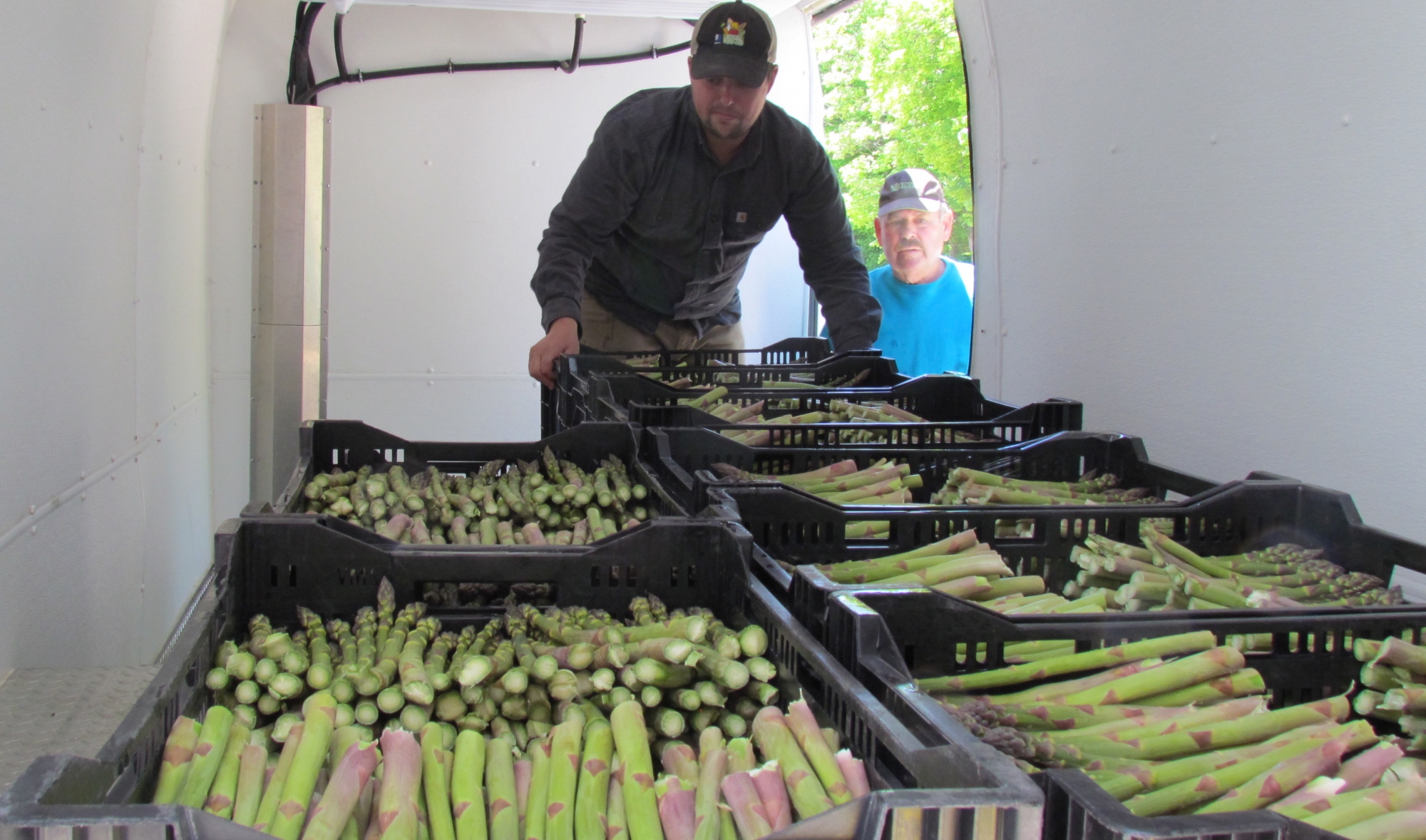Above: Loma Farm workers in morning mist. Image courtesy Loma Farm.
Thank you! In just one single week 504 people collectively raised $130,597 for the Local Food Relief Fund! The donations will fund northwest Michigan food pantries to purchase food from local farmers and feed families hit hard economically by COVID-19.
We finished the fund drive last night at midnight, and this morning, we are feeling incredibly humbled and inspired by the generosity and compassion of our community.
I want to take a quick minute to share a few thoughts on how something incredible like this happens.
It really starts with a caring, connected community. I’ve always thought there is something special about our home here in northwest Michigan. People here are connected in a different way. Connected to the land. Connected to each other. And there’s a kindness and compassion here that I see all the time—and I so value it. And it’s also the community that has come together around Groundwork over the years, which extends across Michigan and across the country. Wonderful, committed people who believe in our work to build resilient communities and who stay connected and supportive to help push us forward. Thank you all!

One of the things that makes the Local Food Relief Fund so important is that the funds will go directly to the costs of purchasing food from local farmers. We know these funds will be put toward the intended use on food pantry shelves thanks to the work of three crucial partners: the Northwest Food Coalition, Food Rescue, and the Manna Food Project. We are inspired by these incredible organizations—and so very grateful for the good work they do. And how bout those beautiful videos from Jessyca Stoepker at Manna, Mary Clulo of the Northwest Food Coalition, and Susan Sharp of Open Sky Organic Farm? Wow! The videos are brief but powerful and reveal the kind of commitment these good people have for helping families and farmers and serving our community.
When you launch something bold and new like this you need early affirmation. And, boy, did we get that! We had a special meeting of the Board Executive Committee of Groundwork to make sure we had a plan for navigating the uncertainty of coronavirus, both internally and externally with our programs. We addressed a number of important issues, and when I floated the idea of putting some energy into an emergency action to help farmers and people in need, our Executive Committee showed strong and unanimous support. That really meant a lot.
And people stepped forward with early financial commitments too. Our fantastic Board Chair, Roger Newton, stepped forward with a major financial commitment, and he stayed right with us as we built and advanced the project, inspiring us every step of the way. Other Board members jumped in quickly too, including Denis Pierce, Ed Gergosian, and John Bercini. And I want to thank our longtime supporter and good friend Bob Garvey, who responded quickly to an early email with a generous financial pledge. I knew we were on track when my phone rang early in the campaign and it was our friend Doug DeYoung, the Vice President of Government Relations and Business Development for Consumers Energy, who was encouraging me to submit an application for emergency funding. Well, that turned out to be a $10,000 grant—and we are really grateful for that. (It was these early donors who made up the challenge match we leveraged to get from $50,000 to $100,000!)
I am really proud of how our staff rallied around this. Our Food and Farming team consists of Diane Connors, Paula Martin, Jen Schaap, Casey Hagerty, Christina Barkel, and Meghan McDermott—and they are the smart and powerful women who really drove this forward. Meghan was the captain of this campaign and strengthened us all with her strong and steady leadership (check out her great video below). Also big thanks to the communications team of Jeff Smith, Bill Latka, and Miriam Owsley, who brought so much talent, creativity, and hard work to keep the momentum going. I am so grateful to these beautiful people and just flat out proud of the entire Groundwork staff.
And the really big news? The donations invested into the fund are already doing their job! We reached the $100,000 funding target on April 14, about noon, and not even two hours later—at 1:47pm—our lead farmer liaison, Christina Barkel, wrote this note to our staff: “The first 4 bins (~3,500lbs) of local vegetables purchased by the Local Food Relief Fund will be picked up on Friday!”
Incredible! And it’s this kind of execution that we’ll be advancing in the days and weeks to come, as a result of your generosity. Thanks again to all who made this possible!
Last week, about midway through the fund drive, we saw a news story from California about farmers who were plowing under crops due to vanishing markets at closed restaurants and schools, while food pantry shelves sat empty just a few miles away. That is precisely the situation we are trying to avoid by creating the Local Food Relief Fund. We don’t have a crystal ball, but our team has worked so long and deeply in the food system that we could see this kind of thing was headed our way if we didn’t take action.
Also, while our big fundraising drive is over (whew!), you can still make a donation to the Local Food Relief Fund (perhaps you intended to but just didn’t get around to it?). Just click here and when you get to the giving site scroll down to the giving form. All additional donations will be put toward the fund and managed in accordance with the same structure as it was initially designed.
Thanks so very much everyone!
We will keep you posted on the results and impact of the Local Food Relief Fund!




